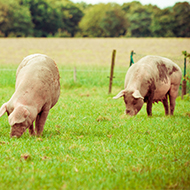
Submission document sets out concerns UK remains ‘poorly protected’.
The National Pig Association (NPA) is calling on the UK government to prioritise national biosecurity as part of its upcoming Spending Review.
In its full submission document, the NPA recommends investment to protect the UK’s national biosecurity and grant funding to support investment on farm.
The document sets out the NPA’s concerns that the UK remains ‘poorly protected from biosecurity and notifiable disease threats’ — particularly given the recent discovery of foot-and-mouth disease in Germany and continuing reports of African Swine Fever across Europe.
It states that since October 2022, more than 170 tonnes of illegal meat products have been seized at the Port of Dover, in spite of limited funding and only a small number of vehicles being investigated. During the week beginning 6 January alone, the ASF team at Dover removed 10 tonnes of illegal meat from the food chain.
The document also notes that the Border Target Operating Model (BTOM), which controls and monitors, commercial imports, ‘‘does not appear to be functioning properly with very few physical inspections of products of animal origin (POAO) from the EU and rest-of-world taking place’.
It adds: “In the short term we would like to see the government address some of the concerns outlined above with regards to the functioning of the BTOM. Given the current failings involving both BTOM and personal imports, we believe a wholesale review of the process is required”.
The NPA is urging the government to provide port health authorities and local authorities with the resources to properly enforce control measures, stating: “It is a relatively small investment in order to help prevent a potentially catastrophic disease outbreak in the UK. Therefore, we urge the government to agree a multi-year funding proposal for not just DPHA, but other agencies conducting this vital work.”
The full NPA submission is available to read at nationalpigassociation.co.uk



 The Federation of Independent Veterinary Practices (FIVP) has announced a third season of its podcast, Practice Matters.
The Federation of Independent Veterinary Practices (FIVP) has announced a third season of its podcast, Practice Matters.